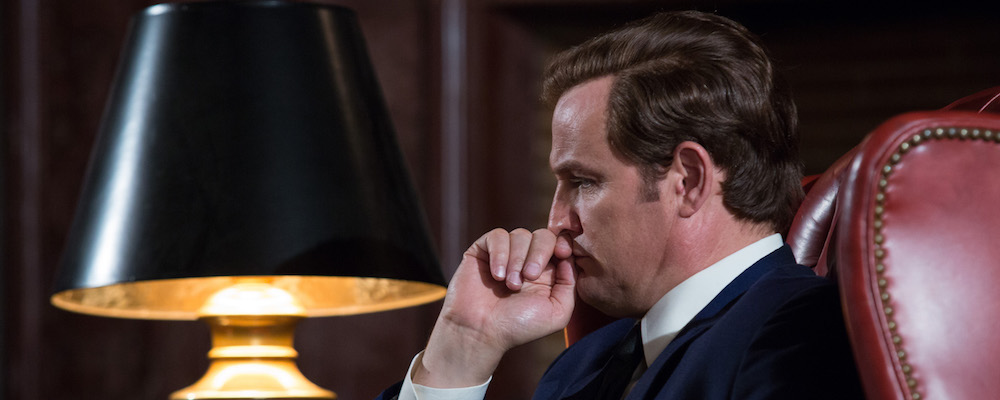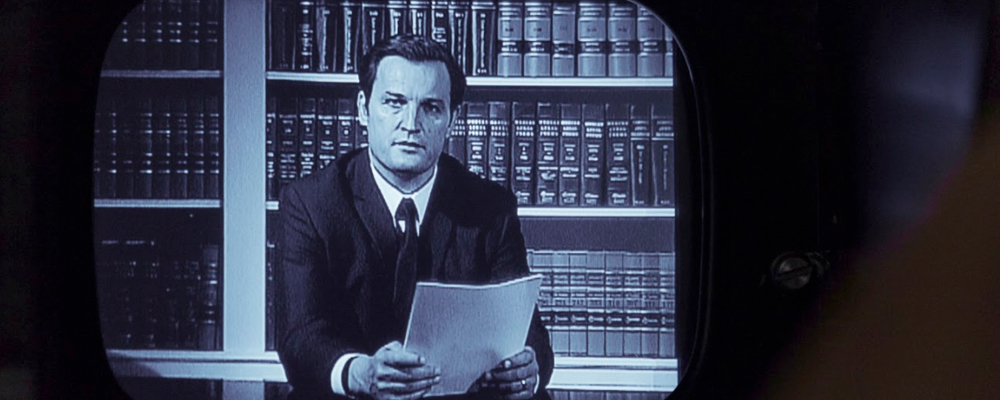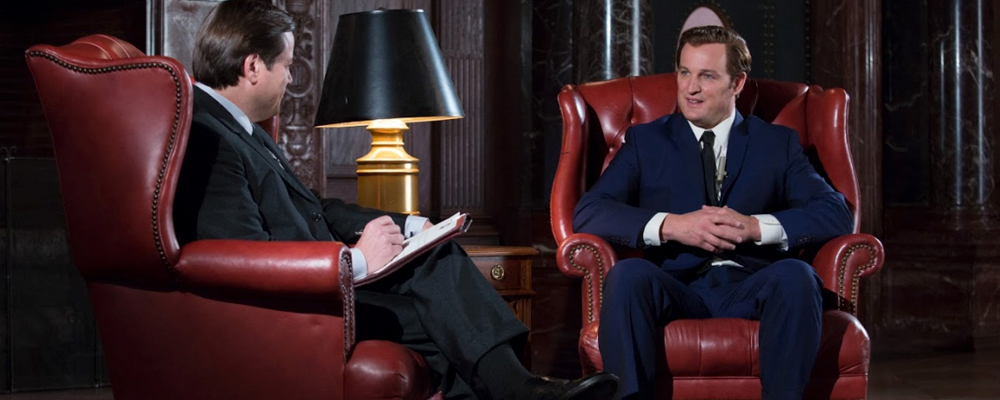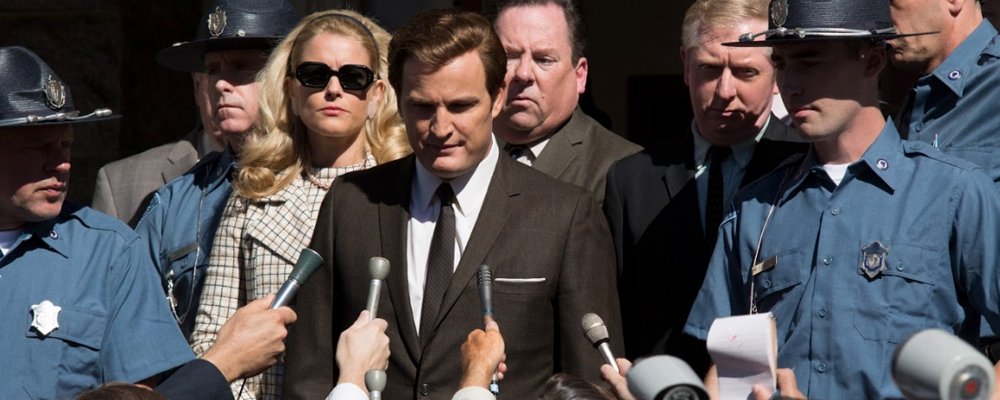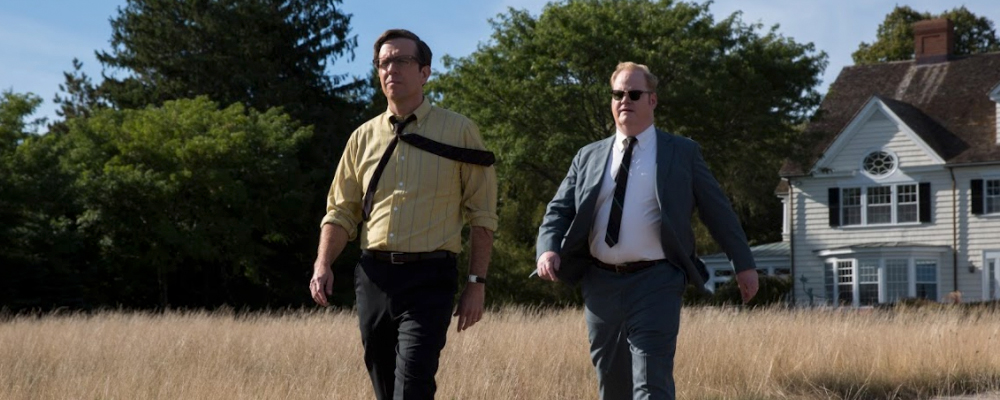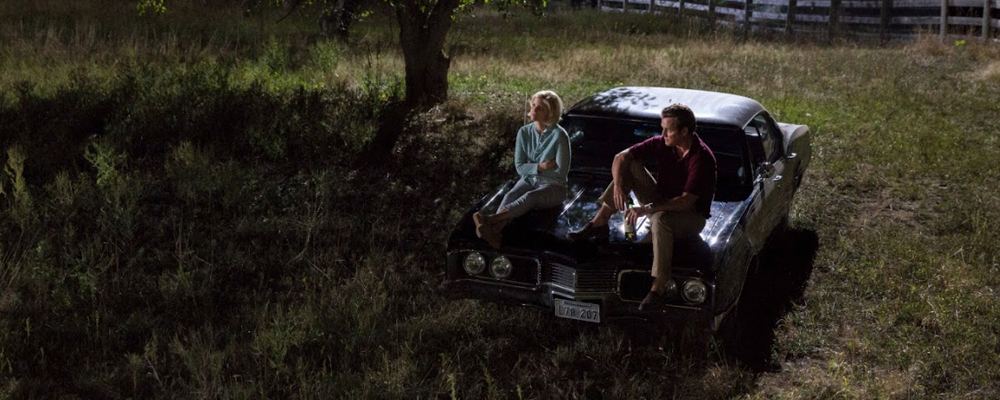Jason Clarke and Jim Gaffigan on Revisiting Kennedy Scandal in ‘Chappaquiddick’
Alci Rengifo
Late in the evening on July 18, 1969, Senator Edward “Ted” Kennedy left a party accompanied by a young campaign staffer named Mary Jo Kopechne. The outing would end tragically as Kennedy drove his car off a one-line bridge and into the waters of Chappaquiddick Island. Kennedy would escape the sinking vehicle and Kopechne would drown. What exactly happened, and why, remains one of the great controversies of American political scandal. The tragedy and its legal and political fallout are now the subject of the dark, intense drama “Chappaquiddick.”
Directed by John Curran, the film stars Jason Clarke as Kennedy in an eerie performance full of spoiled ego and political cynicism. The rest of the cast is a stellar spread which includes Jim Gaffigan as Kennedy confidant and U.S. attorney Paul Markham, Bruce Dern as stern family patriarch Joseph Kennedy and Kate Mara as Kopechne, loyal to the Kennedy dream but doomed by one fateful decision.
Clarke and Gaffigan recently sat down with Entertainment Voice to discuss bringing historical characters to life around a true story that remains controversial and relevant to this day.
“It was a long process for me to know I wanted to do it, know I could do it and finally wonder if I should do it,” said Clarke. “I love the time and the history. I love politics. But I read the script on a plane and was struck by the conundrum of this man who came out from a woman dead in a car crash that he caused to being elected to the senate again. I thought, ‘holy shit, how did this happen?’ Then I read it again off the plane and again thought, ‘come on man, this isn’t real, this couldn’t have happened.’ I went down the rabbit hole.” Clarke was particularly rattled by the forensic evidence revealing that Kopechne likely died a long, excruciating death trapped in the car while Kennedy waited hours to report the accident. The theatricality of it all made a deep impression as well, especially the idea that Kennedy wore a neck brace at Kopechne’s funeral to gain sympathy. “The more I went into this event and what came after and where we are now it just hit me, it makes sense where we are now. Has much changed?”
“I come from a mid-western, Irish Catholic family, so all the Kennedy stories are very alive and well. I have a large head and Kennedys have large heads,” said Gaffigan with his humorous touch when discussing his own introduction to the project. “But growing up I remember the importance of Chappaquiddick. I remember there was once an SNL sketch where one of the characters would keep saying ‘Chappaquiddick’ every time Ted Kennedy would open his mouth. I also had a lot of interest in this because of the power Ted Kennedy retained. I don’t know if you remember when he endorsed John Kerry in 2004 for president. Back then we all thought it would be Howard Dean, Kerry had done ok but then Kennedy ‘knighted’ him and we were all like, ‘ok, it’s John Kerry then.’ So this was definitely a script I wanted to read.”
Clarke himself studied many of the old newsreels of historic moments, including Ted Kennedy’s moving eulogy following the murder of his brother Bobby in 1968. Clarke believes the events of the years preceding Chappaquiddick give a window into the senator’s mental state. “It gives you some context of possibly the clinically depressed state Ted was in, or at least an existential crisis,” said Clarke. “That was what made it so compelling for me.”
Gaffigan focused on getting to know just enough. “I didn’t want to just go ‘oh look, I found out he went to high school in D.C.,’ the important element was to communicate that Paul was someone who symbolized the desire to get into the Kennedy circle but as they say, you gotta be careful what you wish for. He was very much somebody who was excited, he was at this weekend house with Ted, they were gonna do good. He was going to be a player, but then he gets pulled into this mess. Who knows, he could have gone into the Supreme Court, but following Chappaquiddick there was this question of ‘did he contribute to this cover up?’”
For Clarke journeying into the world of Ted Kennedy revealed many details which have stayed with him. “I read and watched everything I could. I started on a linear level with the family. I started with Joe and worked my way to Ted. Joe was just fascinating. This is where Ted came from. They say Joe was an overbearing father, but I read that when he died Ted spent the night in his bed.” Clarke had actually met Ted Kennedy briefly during a boat race in Hyannis Port. “I was shooting a series for Showtime called ‘Brotherhood,’ I was playing a politician, a Democratic politician who was Catholic. The locals were very friendly and told us there was an annual boat race going on. Ted sailed it, he loved the sea. Someone said if I would love to meet Ted Kennedy and I said I’d love to. It’s a hand shake you don’t turn down.”
Gaffigan’s welcome challenge was to play such a dramatic role in a genre he is not readily associated with, being known primarily for comedy. “I’ve done a fair amount of acting and some dramatic work, but in the perception realm, because I have some success in stand-up people say ‘he’s a comedian, why would he want to do any acting?’ But hey, I was also a stock boy at a grocery store too.”
To actually portray the senator in the movie Clarke underwent some interesting makeup processes where just enough was changed without doing a complete makeover. “I had teeth put in and a wig. It was a deliberate choice not to go full prosthetics. This story resides on an emotional level and moral, intellectual level. So you had to accept very quickly that this is a man who happens to be Ted Kennedy. We wanted just enough. My teeth are not like Ted’s, so it was months of getting the size right, making sure I wouldn’t have a lisp. Initially we made them too big for my jaw. In the end you want to bring the audience in to me.”
“What I love about drama is that you can hide in the character,” said Gaffigan. “Whereas in stand-up you’re up there writing, directing and performing. I love acting because in the end it is like dress up, like ‘ok I’m going to play a guy from Boston, who wears a suit, who is a lawyer from 1969.’ That’s fun. I have children, that’s what they’re doing, I mean they’re not doing Boston lawyers.” Gaffigan also appreciates the patience audiences afford a drama. “With comedy audiences are like, ‘I haven’t laughed in 25 seconds!’” In “Chappaquddick” Galligan creates an overwhelming sense of a crushing conscience. “It’s moments of silence where you’re sitting there thinking, ‘am I breaking the law? I am a U.S. Attorney. Is this wrong?’”
It doesn’t escape Clarke that “Chappaquiddick” re-creates the past with a story that has startling relevance in the present. “If you hate Ted Kennedy coming into this then you’re going to hate him while watching it. But I think it’s hard to be blinkered to what he did though, because we don’t go into the salacious or trivial. It’s not about whether he had sex on the beach with Mary Jo, the film is not about that. It’s about his moral choices. And you can connect the dots to today with either white men of privilege or anyone of privilege just getting away with things on a political level. It’s this attitude of ‘if I can I will.’”
“Chappaquiddick” releases April 6 in theaters nationwide.

